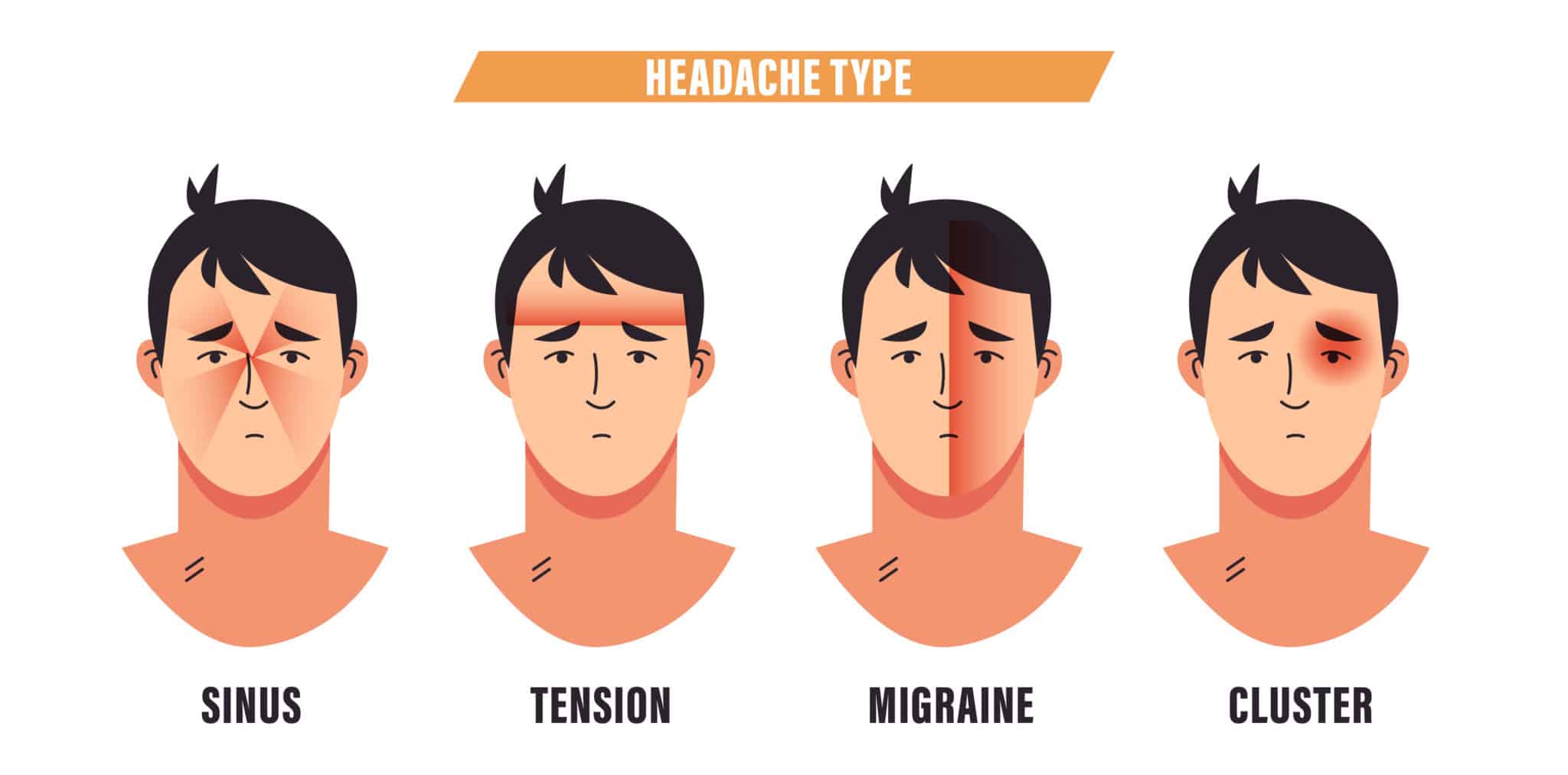What are the symptoms of a tension headache?
Tension headaches are characterized by a dull, aching pain and a sensation of tightness or pressure around the head. Common symptoms include:
- Dull, Steady Pain: The pain is typically described as a constant, dull ache rather than a throbbing sensation. It often feels like a tight band or pressure around the forehead or the back of the head.
- Tightness or Pressure: Many people describe a feeling of tightness or pressure around the scalp, forehead, or neck, as if a band is squeezing the head.
- Mild to Moderate Pain: The pain is usually mild to moderate in intensity and can be persistent. It typically does not interfere significantly with daily activities but can be bothersome.
- Muscle Tension: Tenderness or tightness in the muscles of the neck, shoulders, or jaw may accompany the headache. This is due to muscle strain often associated with tension headaches.
- No Nausea or Vomiting: Unlike migraine headaches, tension headaches generally do not cause nausea, vomiting, or visual disturbances.
- No Aura: Tension headaches do not usually involve an aura (visual or sensory disturbances) that can occur with migraines.
- Pain Location: The pain is commonly felt on both sides of the head and can involve the forehead, temples, or the back of the head. It may also extend to the neck and shoulders.
- Fatigue and Irritability: Chronic tension headaches can lead to fatigue, irritability, or difficulty concentrating, though these are secondary symptoms rather than primary ones.
These symptoms typically result from stress, muscle tension, or other factors that contribute to headache development. The pain from tension headaches is generally less severe than that of migraines and does not usually affect daily functioning to the same extent.
What are the causes of a tension headache?
Tension headaches are often caused by a combination of physical, psychological, and environmental factors. Common causes include:
- Muscle Tension: Prolonged muscle tension in the neck, shoulders, and scalp due to poor posture, prolonged sitting, or repetitive movements can lead to tension headaches.
- Stress: Emotional stress, anxiety, and mental strain are significant contributors to tension headaches. Stress can lead to muscle tension and exacerbate headache symptoms.
- Poor Posture: Sitting or standing in a poor posture for extended periods, such as when working at a desk or using electronic devices, can strain the neck and back muscles, leading to headaches.
- Mental Fatigue: Long periods of mental exertion or concentration, such as working on a computer or studying, can contribute to tension headaches.
- Sleep Issues: Lack of sleep, poor sleep quality, or irregular sleep patterns can increase the likelihood of tension headaches.
- Jaw Clenching or Teeth Grinding: Clenching the jaw or grinding teeth, often related to stress or anxiety, can strain the muscles around the jaw and head, leading to headaches.
- Eye Strain: Prolonged use of screens, inadequate lighting, or uncorrected vision problems can cause eye strain and contribute to tension headaches.
- Dehydration: Not drinking enough water can lead to dehydration, which may trigger or worsen tension headaches.
- Dietary Factors: Skipping meals or consuming excessive caffeine or alcohol can contribute to headache development.
- Environmental Factors: Exposure to bright lights, loud noises, or strong odors can sometimes trigger tension headaches.
- Medical Conditions: Certain medical conditions, such as sinus infections or temporomandibular joint (TMJ) disorders, can contribute to tension-type headaches.
Understanding and addressing these underlying causes can help in managing and preventing tension headaches. Adopting stress-relief techniques, improving posture, and making lifestyle adjustments are often effective in reducing the frequency and severity of these headaches.
What is the treatment for a tension headache?
Treatment for tension headaches typically involves a combination of self-care measures, lifestyle changes, and, in some cases, medication. The approach aims to relieve pain, reduce muscle tension, and address underlying causes. Here are common treatments:
- Over-the-Counter Pain Relievers: Nonsteroidal anti-inflammatory drugs (NSAIDs) like ibuprofen or aspirin, or acetaminophen, can help alleviate pain. These medications are often effective for relieving mild to moderate tension headaches.
- Stress Management: Techniques such as deep breathing exercises, meditation, progressive muscle relaxation, or mindfulness can help reduce stress and prevent tension headaches.
- Physical Therapy: Exercises and stretches prescribed by a physical therapist can help relieve muscle tension in the neck, shoulders, and upper back. They may also offer guidance on proper posture and ergonomics.
- Massage Therapy: Gentle massage of the neck, shoulders, and scalp can help reduce muscle tension and improve circulation, providing relief from tension headaches.
- Heat or Cold Therapy: Applying a warm compress or heating pad to the neck and shoulders can help relax tight muscles. Alternatively, a cold pack on the forehead or back of the neck may reduce pain and inflammation.
- Ergonomic Adjustments: Improving workstation ergonomics, such as using an ergonomic chair, adjusting the desk height, and positioning the computer screen correctly, can help prevent strain and reduce headache frequency.
- Hydration: Drinking plenty of water throughout the day can help prevent dehydration-related headaches.
- Regular Exercise: Engaging in regular physical activity can help reduce overall muscle tension and stress, potentially reducing the frequency of tension headaches.
- Good Sleep Hygiene: Maintaining a regular sleep schedule and creating a comfortable sleep environment can improve sleep quality and reduce headache occurrence.
- Avoiding Triggers: Identifying and avoiding triggers, such as excessive caffeine, poor posture, or prolonged screen time, can help prevent tension headaches.
- Behavioral Therapy: Cognitive-behavioral therapy (CBT) can help individuals manage stress and develop coping strategies, which may be beneficial for chronic tension headaches.
- Prescription Medications: For frequent or severe tension headaches, a doctor may prescribe medications such as antidepressants (e.g., amitriptyline) or muscle relaxants. These are generally used when over-the-counter options are insufficient.
If tension headaches are persistent or significantly interfere with daily life, it’s important to consult a healthcare provider for a thorough evaluation and personalized treatment plan.

Leave a Reply
You must be logged in to post a comment.